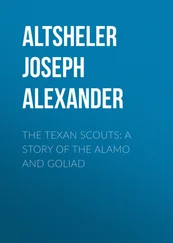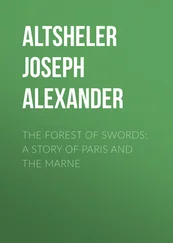Joseph Altsheler - The Star of Gettysburg - A Story of Southern High Tide
Здесь есть возможность читать онлайн «Joseph Altsheler - The Star of Gettysburg - A Story of Southern High Tide» — ознакомительный отрывок электронной книги совершенно бесплатно, а после прочтения отрывка купить полную версию. В некоторых случаях можно слушать аудио, скачать через торрент в формате fb2 и присутствует краткое содержание. Жанр: foreign_children, foreign_antique, foreign_prose, prose_military, на английском языке. Описание произведения, (предисловие) а так же отзывы посетителей доступны на портале библиотеки ЛибКат.
- Название:The Star of Gettysburg: A Story of Southern High Tide
- Автор:
- Жанр:
- Год:неизвестен
- ISBN:нет данных
- Рейтинг книги:3 / 5. Голосов: 1
-
Избранное:Добавить в избранное
- Отзывы:
-
Ваша оценка:
- 60
- 1
- 2
- 3
- 4
- 5
The Star of Gettysburg: A Story of Southern High Tide: краткое содержание, описание и аннотация
Предлагаем к чтению аннотацию, описание, краткое содержание или предисловие (зависит от того, что написал сам автор книги «The Star of Gettysburg: A Story of Southern High Tide»). Если вы не нашли необходимую информацию о книге — напишите в комментариях, мы постараемся отыскать её.
The Star of Gettysburg: A Story of Southern High Tide — читать онлайн ознакомительный отрывок
Ниже представлен текст книги, разбитый по страницам. Система сохранения места последней прочитанной страницы, позволяет с удобством читать онлайн бесплатно книгу «The Star of Gettysburg: A Story of Southern High Tide», без необходимости каждый раз заново искать на чём Вы остановились. Поставьте закладку, и сможете в любой момент перейти на страницу, на которой закончили чтение.
Интервал:
Закладка:
But the Southern army, save for a small force, did not occupy Fredericksburg itself.
Along the low ridge, a mile or so west of the town, Longstreet had been posted and he had dug trenches and gunpits. The crest of this ridge, called Marye's Hill, was bare, and here, in addition to the pits and trenches, Longstreet threw up breastworks. Down the slopes were ravines and much timber, making the whole position one of great strength. Harry gazed at it as he carried one of his messages from general to general, and he was enough of a soldier to know that an enemy who attacked here was undertaking a mighty task.
But Burnside did not move, and the somber blanket of winter thickened. More snows fell and the icy rains came again. Then the mercury slid down until it reached zero. Thick ice formed over everything and some of the shallower brooks froze solidly in their beds. The Southern lads were not nearly so well equipped against the winter as their foes. Not many had heavy overcoats, and blankets and shoes were thin and worn.
The forest was now their refuge. The river was lined thickly with it, running for a long distance, and thousands of axes began to bite into the timber. Hardy youths, skilled in such work, they rapidly built log huts or shelters for themselves, and within these or outside under the trees innumerable fires blazed along the Rappahannock, the crackling flames sending a defiance to other such flames beyond the frozen river.
Harry had a letter from Dr. Russell, which had come by the way of the mountains and Richmond. He had already heard of the terrible day of Perryville in Kentucky, and the doctor had been able to confirm his earlier news that his father, Colonel Kenton, had passed through it safely. But the hostile armies in the west had gone down into Tennessee, and there were reports that they would soon move toward each other for a great battle. It seemed that the rival forces in both east and west would meet at nearly the same time in terrible conflict.
Dr. Russell told that Dick Mason had been wounded in the combat at Perryville, but had been nursed back to health by his mother, who with others had found him upon the field. He had since gone into Tennessee to rejoin the Union army, and his mother had returned to Pendleton.
Harry folded the letter, put it in his pocket, and for a while he was very thoughtful.
It was a great relief to be sure that his father had gone safely through Perryville, and that Dick Mason, although wounded there, was well again. His heart yearned over both. His devotion to his father had always been strong and Dick Mason had stood in the place of a brother. They were alive for the present at least, but Harry knew of the sinister threat that hung over the west. The terrible battle that was to be fought at Stone River was already sending forth its preliminary signals, and for a little while Harry thought more of those marching forces in Tennessee than of the great army to which he belonged and of the one yet more numerous that faced it.
But these thoughts could not last long. The events in which he was to have a part were too imminent and mighty for anyone to detach himself from them more than a few minutes. He quickly returned, heart and soul, to his duties, which in these days took all his time. Many messages were passing between Lee and Jackson and Longstreet and the commanders next to them in rank, and Harry carried his share.
A few days after the letter from Dr. Russell the cold abated considerably. The ice in the river broke, the melting snows made the country a sea of mud and slush and horses often became mired so deeply that it took a dozen soldiers to drag them out again. It was on such a day as this that Dalton came to him, his grave face wearing a look of importance.
"General Jackson has just told me," he said, "to take you and join General Stuart, who is going with his horse to the neighborhood of Port Royal on the river."
"What's up?"
"Nothing's up yet. But we understand that some of the Yankee gunboats are trying to get up, now that they have a clear passage through the ice."
"Cavalry can't stop them."
"No, but Stuart is taking horse artillery with him, and he's likely to make it warm for the enemy in the water. Harry, if we only had a navy, too, this war wouldn't be doubtful."
"But, as we haven't got a navy, it is doubtful, very doubtful."
They quickly joined General Stuart, who was eager for the duty, and falling in line with the troop of Sherburne rode swiftly toward Port Royal, the cavalrymen carrying with them several light guns.
As they galloped along, mixed mud and snow flew in every direction, but most of them had grown so used to it that they paid little attention. The river flowed a deep and somber stream, and all the hills about were yet white with snow. At that time, colored too, as it was by his feelings, it was the most sinister landscape that Harry had ever looked upon. Black winter and red war, neither of which spared, were allied against man.
But his pulses began to leap when they saw coils of black smoke blown a little to one side by the wind. He knew that the smoke came from gunboats. They must be endeavoring to land troops, and Stuart was no man to allow a detached force to pass the Rappahannock and appear in their rear.
As the cavalry burst into a gallop from the snowy forest Harry saw that he was right. A fleet of gunboats was gathered in the stream and on the far shore they were embarking troops. But his quick eye caught a horseman on their own side of the river who was galloping away. He was already too distant for a rifle shot, but Harry instinctively knew that it was Shepard. He had seen the man under such extraordinarily vivid circumstances that the set of his figure was familiar.
Nor was he surprised to behold Shepard now. He merely wondered that he had not seen him earlier, so great was his activity and daring, and he had no doubt that he had brought the gunboats and the Union troops warning that Stuart was coming. He was sure of it the moment the cavalry emerged from the woods, because one of the gunboats instantly turned loose with two heavy guns which sent shells whistling and screaming over their heads. Had they been a little better aimed they would have done much destruction, and Harry saw at once that they were going to have an ugly time with these saucy little demons of the water.
Another boat fired. One of the cavalrymen was killed and several wounded. Stuart promptly drew his men back to the edge of the wood, unlimbered and posted his cannon. Quick as they were, the black wasps on the river buzzed and stung as fast. Shells and solid shot were whistling among them and about them. They were good gunners on those boats and the men in gray acknowledged it by the rapidity with which they took to shelter.
But Stuart's blood was at its utmost heat. He had no intention of being driven off, and soon his own light guns were sending shell and solid shot toward the boats, which had relanded their troops on the other side, and which were now puffing up and down the river like the angry little demons they were, sending shells, solid shot, grape and canister into the woods and along the slopes where the horsemen had disappeared.
Harry and Dalton were glad to dismount and to get behind both the trees and the curve of the embankment. Harry, despite a pretty full experience now, could not repress involuntary shivers as the deadly steel flew by. He and Dalton had nothing to do but hold their horses and watch the combat, which they did with the keenest interest.
Stuart's cannon had unlimbered in a good place, where they were protected partly by a ridge, and their deep booming note soon showed the gunboats that they had an enemy worthy of their fire. Dalton and Harry looked on with growing excitement. Dalton, for once, grew garrulous, talking in an excited monotone.
Читать дальшеИнтервал:
Закладка:
Похожие книги на «The Star of Gettysburg: A Story of Southern High Tide»
Представляем Вашему вниманию похожие книги на «The Star of Gettysburg: A Story of Southern High Tide» списком для выбора. Мы отобрали схожую по названию и смыслу литературу в надежде предоставить читателям больше вариантов отыскать новые, интересные, ещё непрочитанные произведения.
Обсуждение, отзывы о книге «The Star of Gettysburg: A Story of Southern High Tide» и просто собственные мнения читателей. Оставьте ваши комментарии, напишите, что Вы думаете о произведении, его смысле или главных героях. Укажите что конкретно понравилось, а что нет, и почему Вы так считаете.












